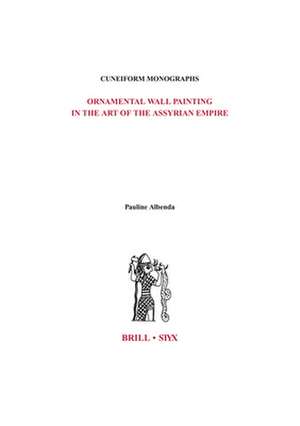Ornamental Wall Painting in the Art of the Assyrian Empire: Cuneiform Monographs, cartea 28
Autor Pauline Albendaen Limba Engleză Hardback – 28 noi 2004
Ornamental wall painting created a colorful and meaningful visual impact to the rooms of residences belonging to the Assyrian kings. The assembled material demonstrates that the polychrome and black-and-white decorated bands of geometric, floral, figural, and animal motifs were arranged into a variety of formulaic designs. Particular attention is given to the changing trends in the selection and combination of motifs, some of which had symbolic meaning. The chronology of the wall paintings at Til Barsip and the accompanying discussion of textile patterns are of special interest to the art historian. This book illustrates the ornamental wall paintings as recorded in the excavation reports.
Din seria Cuneiform Monographs
- 18%
 Preț: 939.81 lei
Preț: 939.81 lei - 15%
 Preț: 540.47 lei
Preț: 540.47 lei - 18%
 Preț: 1652.48 lei
Preț: 1652.48 lei - 18%
 Preț: 1287.49 lei
Preț: 1287.49 lei - 18%
 Preț: 1075.02 lei
Preț: 1075.02 lei - 18%
 Preț: 929.10 lei
Preț: 929.10 lei - 18%
 Preț: 950.26 lei
Preț: 950.26 lei - 18%
 Preț: 802.67 lei
Preț: 802.67 lei - 18%
 Preț: 1156.00 lei
Preț: 1156.00 lei - 18%
 Preț: 948.27 lei
Preț: 948.27 lei - 18%
 Preț: 921.74 lei
Preț: 921.74 lei - 18%
 Preț: 1055.61 lei
Preț: 1055.61 lei - 18%
 Preț: 1151.35 lei
Preț: 1151.35 lei - 18%
 Preț: 1198.62 lei
Preț: 1198.62 lei - 18%
 Preț: 1142.66 lei
Preț: 1142.66 lei - 18%
 Preț: 1198.85 lei
Preț: 1198.85 lei - 18%
 Preț: 1046.06 lei
Preț: 1046.06 lei - 18%
 Preț: 1263.39 lei
Preț: 1263.39 lei - 18%
 Preț: 1010.22 lei
Preț: 1010.22 lei - 18%
 Preț: 871.26 lei
Preț: 871.26 lei - 18%
 Preț: 721.44 lei
Preț: 721.44 lei - 18%
 Preț: 1053.64 lei
Preț: 1053.64 lei - 18%
 Preț: 579.22 lei
Preț: 579.22 lei - 18%
 Preț: 843.52 lei
Preț: 843.52 lei - 18%
 Preț: 1235.20 lei
Preț: 1235.20 lei - 18%
 Preț: 814.95 lei
Preț: 814.95 lei -
 Preț: 363.01 lei
Preț: 363.01 lei - 18%
 Preț: 1821.27 lei
Preț: 1821.27 lei - 18%
 Preț: 1006.78 lei
Preț: 1006.78 lei - 18%
 Preț: 883.07 lei
Preț: 883.07 lei - 18%
 Preț: 1485.73 lei
Preț: 1485.73 lei - 18%
 Preț: 1175.72 lei
Preț: 1175.72 lei - 18%
 Preț: 631.60 lei
Preț: 631.60 lei - 18%
 Preț: 1074.03 lei
Preț: 1074.03 lei - 18%
 Preț: 862.90 lei
Preț: 862.90 lei - 18%
 Preț: 1205.68 lei
Preț: 1205.68 lei - 18%
 Preț: 1070.18 lei
Preț: 1070.18 lei - 18%
 Preț: 743.69 lei
Preț: 743.69 lei
Preț: 784.54 lei
Preț vechi: 956.76 lei
-18% Nou
Puncte Express: 1177
Preț estimativ în valută:
150.12€ • 157.16$ • 124.22£
150.12€ • 157.16$ • 124.22£
Carte indisponibilă temporar
Doresc să fiu notificat când acest titlu va fi disponibil:
Se trimite...
Preluare comenzi: 021 569.72.76
Specificații
ISBN-13: 9789004141544
ISBN-10: 9004141545
Pagini: 148
Dimensiuni: 171 x 245 x 14 mm
Greutate: 0.53 kg
Editura: Brill
Colecția Brill
Seria Cuneiform Monographs
ISBN-10: 9004141545
Pagini: 148
Dimensiuni: 171 x 245 x 14 mm
Greutate: 0.53 kg
Editura: Brill
Colecția Brill
Seria Cuneiform Monographs
Notă biografică
Pauline Albenda, Ph.D. (1969), in Art history and Archaeology, Columbia University. She is an Art Historian and Educator. Her many articles on Assyrian art have appeared in academic journals, and she has authored Monumental Art of the Assyrian Empire: Dynamics of Composition Styles (Undena, 1998).
